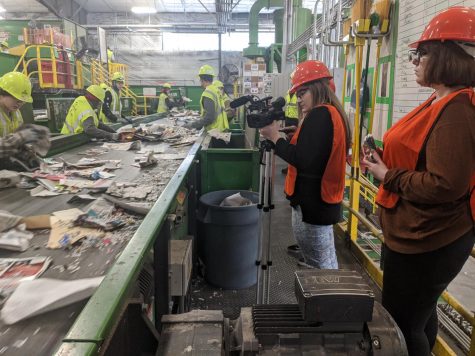Ellensburg Recycles and Here’s How
February 19, 2020
One of the main things CWU is trying to improve about itself as an institution is in its campus’ sustainability. This was one of President James L. Gaudino’s three long-term goals that he announced at his 2019 State of the University, when he pledged to reduce the carbon footprint of the Ellensburg campus by 5% over the next five years.
One of the ways CWU does this is through its waste disposal processes. CWU works with the City of Ellensburg and Waste Management to divert waste from a landfill and instead to a recycling center such as the Spokane Materials and Recycling Technology (SMaRT) Center.

According to Waste Management Communications Manager Gary Chittim and Recycling Education and Outreach Specialist Joel Kohlstedt, recyclable waste is all gathered from curbsides and institutions like CWU and taken to a transfer station in Ellensburg. From there, it is put on a train or long-haul truck which brings it to the SMaRT Center in Spokane.
“You don’t want recycling trucks driving across the state back and forth,” Kohlstedt said.
Waste Management is mostly focused on waste collection and the SMaRT Center is one of its sorting facilities. It doesn’t do any of the work directly turning one product into a new product. It has conveyor lines which make use of advanced sensors and human workers to separate glass, plastics and paper products from each other. After they are sorted and wrapped into large blocks, they are shipped to their customers who recycle the raw recyclables into new products.
This process is called single-stream recycling, which allows everyday people to throw all of their recyclable waste into one bin rather than needing to seperate it themselves. According to Chittim, this turns sorting facilities like the SMaRT Center into investments because, while they cost money to build and operate, single-stream recycling is easier for everyday consumers. This means that more people are more likely to recycle, increasing business for Waste Management and incentivizing more sustainable practices.
Glass
Last year, Ellensburg residents were told that on Oct. 1, glass would be removed from the list of accepted recyclables. According to Chittim, this is because of a decreasing demand for used glass products.
“One of the main reasons is the manufacturers have found it cheaper to use the raw materials, sand and other items like that than to actually report glass,” Chittim said. “We don’t have any place to sell [glass] anymore. This is being faced across the globe right now.”
A Waste Management press release added that glass is relatively expensive to recycle because its weight increases transportation costs. It is also hard on collection and processing equipment. This means that overall, glass is more expensive to recycle than recycled glass is worth.
However, Chittim said that Waste Management is still attempting to divert glass from landfills by using what they still get for other purposes.
“What we’re doing with a lot of this is using it as crushed aggregate for our landfills and other facilities and using it for a road base,” Chittim said. “We’re recyclers, this is what we do, right? We hate to see anything go to waste.”


Guy • Apr 26, 2020 at 1:50 am
Also, if it’s too much money to transport glass all over the place – it’s not that hard to buy a big blender and turn it back into sand alternatives.
https://www.sciencefocus.com/science/can-you-turn-glass-back-into-sand/
Guy • Apr 26, 2020 at 1:47 am
OMG we are missing so much opportunity in 3D Printing Application!!!
Why are we waisting so much money on Printing Plastic when we can just chemically convert all campus waste back into 3D Printing materials???? It makes no sense.
Sheeley • Mar 3, 2020 at 10:15 pm
This is great! It is nice to get a glimpse into the process. Sounds like it is a long and twisting road where much of it could end up in landfills. Love recycling, but reducing seems to be the best choice.
faried • Feb 19, 2020 at 6:38 pm
I suggest that education system mandates high school students and University students take environmental and wast management courses before they evolve to adult lives.
Infact there are DVD available at Ellensburg library addressing the impact of plastic on the environment “Plastic Paradise” and “My question is this: Where our Garbage goes”…
Happy 50th Earth Day aniversery is coming in April…
faried